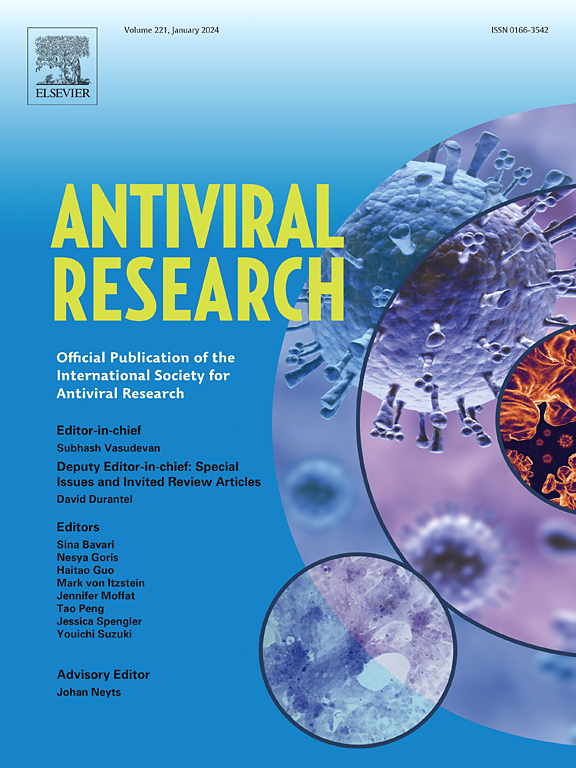Recombinant Pichinde reporter virus as a safe and suitable surrogate for high-throughput antiviral screening against highly pathogenic arenaviruses
IF 4
2区 医学
Q1 PHARMACOLOGY & PHARMACY
引用次数: 0
Abstract
Several arenaviruses, such as the Old World (OW) Lassa virus (LASV) and the New World (NW) Junin virus (JUNV), can cause severe and lethal viral hemorrhagic fevers in humans. Currently, no vaccines or specific antiviral therapies are FDA-approved for treating arenavirus infections. One major challenge for the development of new therapeutic candidates against these highly pathogenic viruses is that they are BSL-3/4 pathogens that need to be handled in high biocontainment laboratories. In this work, a recombinant non-pathogenic New World arenavirus, Pichinde virus (rPICV), was used for the development of a high-throughput screening (HTS) assay in the BSL-2 laboratory for the screening and identification of small molecule inhibitors against arenaviruses. The rPICV is a replication-competent virus expressing the firefly luciferase reporter gene in the infected cells proportionally to the infection rate. rPICV infection was optimized for an automated HTS in 384-well format with robust Z′ scores, high signal-to-background ratios, and low intrinsic variance. Screening an established library allowed for the identification of five top hit compounds, which included ribavirin, a known inhibitor of arenaviral RNA synthesis, showing good potency and selectivity in inhibiting rPICV replication. The antiviral activity of the top hit compounds was further validated against another recombinant arenavirus, the OW lymphocytic choriomeningitis virus (rLCMV) and against laboratory strains of LASV (Josiah) and JUNV (Romero). The use of rPICV in the HTS-based antiviral assay under BSL-2 condition has proven to be safe and suitable for the identification of broad-spectrum small molecule inhibitors against highly pathogenic arenaviruses.
重组皮钦德报告病毒作为高致病性沙粒病毒高通量抗病毒筛选的安全、合适的替代物
一些沙粒病毒,如旧世界(OW)拉沙病毒(LASV)和新世界(NW)朱宁病毒(JUNV),可引起人类严重和致命的病毒性出血热。目前,fda还没有批准用于治疗沙粒病毒感染的疫苗或特定抗病毒疗法。针对这些高致病性病毒开发新的候选治疗方法的一个主要挑战是,它们是BSL-3/4病原体,需要在高度生物防护的实验室中处理。在这项工作中,利用重组的非致病性新世界沙粒病毒Pichinde病毒(rPICV)在BSL-2实验室开发了一种高通量筛选(HTS)方法,用于筛选和鉴定沙粒病毒的小分子抑制剂。rPICV是一种复制能力强的病毒,在感染细胞中表达萤火虫荧光素酶报告基因,与感染率成正比。rPICV感染被优化为384孔格式的自动HTS,具有稳健的Z′分数、高信号与背景比和低内在方差。筛选已建立的文库,鉴定出5个最受欢迎的化合物,其中包括利巴韦林,一种已知的沙粒病毒RNA合成抑制剂,在抑制rPICV复制方面表现出良好的效力和选择性。进一步验证了顶击化合物对另一种重组沙粒病毒OW淋巴细胞性毛囊脑膜炎病毒(rLCMV)的抗病毒活性,以及对LASV (Josiah)和JUNV (Romero)实验室菌株的抗病毒活性。在BSL-2条件下,rPICV用于基于hts的抗病毒试验已被证明是安全的,适用于鉴定高致病性沙粒病毒的广谱小分子抑制剂。
本文章由计算机程序翻译,如有差异,请以英文原文为准。
求助全文
约1分钟内获得全文
求助全文
来源期刊

Antiviral research
医学-病毒学
CiteScore
17.10
自引率
3.90%
发文量
157
审稿时长
34 days
期刊介绍:
Antiviral Research is a journal that focuses on various aspects of controlling viral infections in both humans and animals. It is a platform for publishing research reports, short communications, review articles, and commentaries. The journal covers a wide range of topics including antiviral drugs, antibodies, and host-response modifiers. These topics encompass their synthesis, in vitro and in vivo testing, as well as mechanisms of action. Additionally, the journal also publishes studies on the development of new or improved vaccines against viral infections in humans. It delves into assessing the safety of drugs and vaccines, tracking the evolution of drug or vaccine-resistant viruses, and developing effective countermeasures. Another area of interest includes the identification and validation of new drug targets. The journal further explores laboratory animal models of viral diseases, investigates the pathogenesis of viral diseases, and examines the mechanisms by which viruses avoid host immune responses.
 求助内容:
求助内容: 应助结果提醒方式:
应助结果提醒方式:


